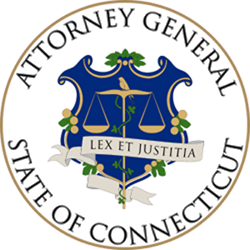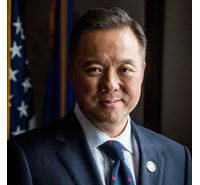Departments
Page 3 of 4
-
Clean Air Act Cases and Challenges
This Department has been very active in representing the State of Connecticut in various actions whose goal is to improve and protect Connecticut’s air quality. These actions include lawsuits against major polluters and regulatory challenges to proposed federal rules that, instead of placing stricter controls on air emissions, would allow more pollution.
-
This department represents the State and the people of Connecticut to ensure that the environment is protected for the benefit of the public health and welfare. This department provides advice and representation in state and federal administrative and court proceedings to the Department of Environmental Protection, the Department of Agriculture, the Connecticut Agricultural Experiment Station, and the Connecticut Marketing Authority, and in court proceedings to the Underground Storage Tank Petroleum Cleanup Account Review Board.
-
The Privacy and Data Security Department
The Privacy and Data Security Department handles matters related to the protection of Connecticut residents' personal information and data. The Department enforces state laws governing notification of data breaches, safeguarding of personal information, and protection of social security numbers and other sensitive information. The Department is also responsible for enforcement of federal laws under which the Attorney General has enforcement authority, including the Health Insurance Portability and Accountability Act of 1996 (HIPAA), the Children's Online Privacy Protection Act (COPPA), and the Fair Credit Reporting Act (FCRA). In addition, this Department provides the Attorney General with advice and counsel on proposed legislation and other matters regarding privacy and data security, and it engages in extensive outreach to citizens and businesses on matters relating to data protection and privacy.
-
This Department represents the Governor, the Judicial Branch, the General Assembly, the Secretary of the State, the Treasurer, the Comptroller, the Auditors of Public Accounts, the State Elections Enforcement Commission, the State Ethics Commission, the State Properties Review Board, the Judicial Review Council, the Judicial Selection Commission, the Office of Protection and Advocacy for Handicapped and Developmentally Disabled Persons, the Accountancy Board, the Office of the Child Advocate, the Office of the Victims Advocate, the Commission on Children, and the Latino and Puerto Rican Affairs Commission. In addition, through its Public Charities Unit, the Department protects the public interest in gifts, bequests and devises for charitable purposes; and in cooperation with the Department of Consumer Protection, administers and enforces state laws regulating charities and professional fundraisers who solicit from the public.
-
The Health and Education Department represents a myriad of state agencies which include the State Department of Education, Department of Mental Retardation, University of Connecticut, and all other agencies that have an educational function. It represents the Department of Social Services, Department of Mental Health and Addiction Services, Psychiatric Security Review Board, Department of Veterans’ Affairs, Commission on Medical and Legal Investigations overseeing the Office of the Chief Medical Examiner, Department of Public Health, Office of Health Care Access, and the various health licensing boards.
-
Public Safety & Special Revenue Frequently Asked Questions & Answers
Frequently Asked Questions & Answers regarding Connecticut's Megan's Law, the State's sex-offender database, how to find an inmate and more.
-
Public Safety & Special Revenue
This department represents the Department of Public Safety, including the Division of State Police, the Division of Fire, Emergency and Building Services; the Military Department; the Department of Correction; the Division of Special Revenue and the Department of Consumer Protection Liquor Control Division. It also provides legal services and representation to a number of associated boards, commissions and agencies, including the Division of Criminal Justice, the Division of Public Defender Services, the Office of Adult Probation, the Governor's Office (Interstate Extradition), the Statewide Emergency 9-1-1 Commission, the State Codes and Standards Committee, the Crane Operator's Examining Board, the Board of Firearms Permit Examiners, the Commission on Fire Prevention and Control, the Board of Pardons, the Board of Parole, Police Officer Standards and Training Council, the Office of Civil Preparedness, the State Marshal Commission, Office of Victim Services and the Gaming Policy Board.
-
Public Safety & Special Revenue Resources
Information is provided on Public Safety, Emergency Services, Criminal Justice & Corrections, how to contact the State Police & State's Attorneys, the Sex Offender Registry, and answers to Motor Vehichle questions, etc.
-
Workers' Compensation & Labor Relations
The Workers’ Compensation and Labor Relations Department represents the Treasurer as the Custodian of the Second Injury Fund, the Workers’ Compensation Commission and the Department of Administrative Services in its capacity as the administrator of the state employees’ workers’ compensation program, as well as DAS Personnel, the Labor Department, the Office of Labor Relations, the Office of Claims Commissioner, the State Employees Retirement Commission, the Teachers’ Retirement Board, and others. The department’s worker’s compensation staff represents the Second Injury Fund in cases involving potential liability of the Fund for workers’ compensation benefits and the State of Connecticut contested workers’ compensation claims filed by state employees, while the labor relations attorneys represent the Department of Labor in unemployment compensation appeals to the Superior Court. The department also represents the Department of Labor’s Wage Enforcement Division, collecting unpaid wages due to Connecticut employees. The department’s workers’ compensation attorneys and paralegals also spend significant time on third party tort-feasor cases that result in the recovery of money for both the state and the Fund, as well as handling a large number of appeals to the Compensation Review Board and on to the Appellate and Supreme Courts.
-
The Health Care Advocacy Unit provides assistance to consumers who have health care problems. This unit provides consumer and provider information.
-
The Attorney General’s Whistleblower Unit investigates information communicated to the Auditors of Public Accounts or the Attorney General regarding corruption, unethical practices, violation of state laws or regulations, mismanagement, gross waste of funds, abuse of authority and danger to the public safety occurring in any state agency.
-
Health Care Fraud / Whistleblower / Health Care Advocacy
This Department has three distinct units, as its title suggests. The Health Care Fraud Unit conducts investigations of Medicaid provider fraud. The Whistleblower unit reviews and investigates allegations by whistleblowers of improper behaviors of state employees, state agencies, quasi state agencies and large state contractors. The Health Care Advocacy Unit provides advisory assistance to consumers who have health care related problems, particularly those that involve health insurance and managed care coverage denials.
-
This department defends the state and its agencies, employees and officials in torts cases brought at the Office of the Claims Commissioner and in the state and federal courts.
-
The primary mission of the Health Care Fraud Unit is to discover and take action concerning health care provider fraud that results in financial loss to the State of Connecticut. The Health Care Fraud Unit develops cases independently and in conjunction with other state and federal law enforcement agencies and with state agencies that pay, directly or indirectly, for health care benefits.
-
If you move within the State of Connecticut, the moving company is regulated by the Connecticut Department of Transportation. You may contact them at (860)594-2860 or visit the Connecticut Department of Transportation website. If you move between a point within Connecticut and a point outside Connecticut, the moving company is regulated by the Federal Motor Carrier Safety Administration. You can find helpful information on their website by following this link to the Federal Motor Carrier Safety Administration’s website. In particular, you should review the booklet entitled “Your Rights and Responsibilities When You Move.” This booklet should answer many of your questions and help you to avoid potential conflicts with your mover. You may contact the Federal Motor Carrier Safety Administration’s Connecticut Regional Office at (860)659-6700 or visit their website.


